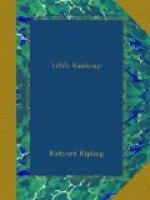‘Then you’ll not even give Mulcahy a—a strike for his money,’ said the voice of Horse Egan, who regarded what he called ‘trouble’ of any kind as the pinnacle of felicity.
Dan answered not at all, but crept on tip-toe, with large strides, to the mess-room, the men following. The room was empty. In a corner, cased like the King of Dahomey’s state umbrella, stood the regimental Colours. Dan lifted them tenderly and unrolled in the light of the candles the record of the Mavericks—tattered, worn, and hacked. The white satin was darkened everywhere with big brown stains, the gold threads on the crowned harp were frayed and discoloured, and the Red Bull, the totem of the Mavericks, was coffee-hued. The stiff, embroidered folds, whose price is human life, rustled down slowly. The Mavericks keep their colours long and guard them very sacredly.
‘Vittoria, Salamanca, Toulouse, Waterloo, Moodkee, Ferozshah, an’ Sobraon—that was fought close next door here, against the very beggars he wants us to join. Inkermann, The Alma, Sebastopol! What are those little businesses compared to the campaigns of General Mulcahy? The Mut’ny, think o’ that; the Mut’ny an’ some dirty little matters in Afghanistan; an’ for that an’ these an’ those’—Dan pointed to the names of glorious battles—’that Yankee man with the partin’ in his hair comes an’ says as easy as “have a drink."... Holy Moses, there’s the captain!’
But it was the mess-sergeant who came in just as the men clattered out, and found the colours uncased.
From that day dated the mutiny of the Mavericks, to the joy of Mulcahy and the pride of his mother in New York—the good lady who sent the money for the beer. Never, so far as words went, was such a mutiny. The conspirators, led by Dan Grady and Horse Egan, poured in daily. They were sound men, men to be trusted, and they all wanted blood; but first they must have beer. They cursed the Queen, they mourned over Ireland, they suggested hideous plunder of the Indian country side, and then, alas—some of the younger men would go forth and wallow on the ground in spasms of wicked laughter.
The genius of the Irish for conspiracies is remarkable. None the less they would swear no oaths but those of their own making, which were rare and curious, and they were always at pains to impress Mulcahy with the risks they ran. Naturally the flood of beer wrought demoralisation. But Mulcahy confused the causes of things, and when a very muzzy Maverick smote a sergeant on the nose or called his commanding officer a bald-headed old lard-bladder and even worse names, he fancied that rebellion and not liquor was at the bottom of the outbreak. Other gentlemen who have concerned themselves in larger conspiracies have made the same error.




